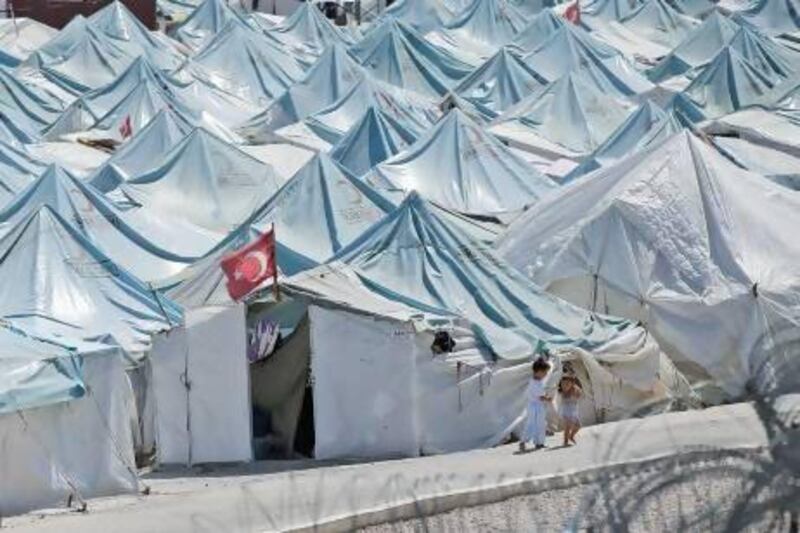ISTANBUL // Turkey's opposition has accused the government of dragging the country into Syria's war by channelling military supplies to rebels and advocating US missile strikes.
Atilla Kart, a leading member of the Republican People's Party (CHP), said at least 16 Saudi air force planes carrying weapons or militants on their way to Syria landed in Ankara in the first four months of this year, making Turkey "a party to the conflict".
Mr Kart said the flights of the Saudi planes were recorded by an online flight tracking programme. He said the fact that the government had tried to keep the flights secret strengthened the suspicion that the jets carried military goods or fighters.
"Turkey has become a country that is a target" for Syrian retaliation, Mr Kart told The National this week. "The government wants Assad to be toppled to exploit the issue both internationally and domestically. This is extremely dangerous."
The accusations from Mr Kart and the CHP, Turkey's largest opposition party, underscore the resistance several leaders who support foreign intervention in Syria are facing at home, including the US, UK and France.
While Ankara says has called for US military strikes against the regime of Bashar Al Assad and supports "a new Syria", the government insisted that its assistance for the rebels is strictly non-military.
Recep Tayyip Erdogan, the prime minister, has said that a possible military intervention by the US after the use of chemical weapons on August 21 should be sufficiently strong to topple Mr Al Assad.
"The intervention should not just be for one or two days, it should bring the regime to the point of giving up," Mr Erdogan said last week.
On Monday, the deputy prime minister Bulent Arinc told reporters after a weekly cabinet meeting in Ankara that punitive attacks by the US would do more harm than good.
"We think a hit-and-run intervention would only increase the chaos in Syria," Mr Arinc said. "Those who are behind this oppression should not be able to get to their feet again as a result" of the US strikes.
Turkey, an estranged ally of Mr Al Assad, is calling for outside intervention and regime change in Damascus to end a civil war that has killed more than 100,000 people and displaced millions since 2011.
The Erdogan government has allowed organisations of both the political and the military wing of the Syrian opposition to work in Turkey, but the government says it is neither sending weapons to fighters in Syria nor allowing other countries to supply the rebels via Turkish territory.
But Mr Kart said that was not true. He said besides the 16 planes that landed in Turkey between January and mid-April, there had been another batch of incoming flights of Saudi military aircraft in mid-August, but he did not know the exact number of planes.
"We want to know what was inside the planes, but we do not get a concrete answer from the government," Mr Kart said. He said the jets could have held weapons or even fighters on their way to Syria.
"Why is all this a secret? Ankara's airport has become a logistical hub" for Syrian rebels, he said.
In response to a written question by Mr Kart in parliament, which the government must answer under parliamentary rules, the foreign ministry said in July that Saudi Arabia was one of several countries sending humanitarian aid for Syrian refugees.
It added that Turkey's help for Syrians and the Syrian opposition was "contributing to the creation of a new Syria". But the answer did not spell out what the Saudi planes were carrying. In May, The New York Times reported that planes from Saudi Arabia, Jordan and Qatar had brought substantial amounts of military supplies bent for Syria to Ankara airport.
Referring to reports saying that Islamist militants were free to use Turkish border towns as bases for sending fighters into Syria, Mr Kart said the government had allowed parts of the border area to slip out of Ankara's grip. "The state has lost its sovereignty, its power to control," he said.
He also said it appeared that the Erdogan government had broken Turkish law by joining a conflict in another country without getting permission from parliament. News reports say the Turkish military has strengthened its defence positions on the border with Syria recently, in addition to three Nato missile defence systems deployed in south-eastern Anatolia to protect member Turkey against possible attacks from Syria.
Sinan Ulgen, chairman of the Center for Economics and Foreign Policy Studies, a think tank in Istanbul, said the development was not unexpected.
"Erdogan made his choice long ago, placing Turkey in the vanguard of countries calling for regime change in Syria," Mr Ulgen said yesterday. "That choice comes with a number of risks."
tseibert@thenational.ae
twitter: For breaking news from the Gulf, the Middle East and around the globe follow The National World. Follow us





